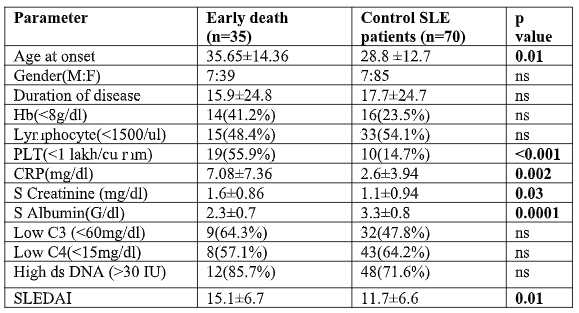Session Information
Session Type: Poster Session (Monday)
Session Time: 9:00AM-11:00AM
Background/Purpose: Mortality in Systemic lupus erythematosus (SLE) has reduced over the years but it is still two to three folds as compared to general population. The major causes of death in SLE are infections and cardiovascular disease. In India due to increased burden of infection and limited access to health care, the causes may be different thus, we studied the causes of death in SLE and its predictors at a tertiary care center in India.
Methods: All patients with SLE (fulfilling ACR 1997 criteria) admitted during 2000-2018 were screened. The records of patients who died in hospital were retrieved and data on disease variables and cause of death were collected. Active disease was defined as patients having SLEDAI2k ≥5. Infections were either bacteriologically proven or based on radiological or serological evidence. Predictor’s for death during first admission at the time of diagnosis of SLE were analyzed by comparing them with two SLE controls (having registration number before and after the index case) who survived. Statistical analysis was done using SPSSv23.0
Results: Among 920 patients admitted during this period,74 died. The mean age at death was 39.2±16.5 years. Thirty-three patients died of infection, 17 of disease activity and 23 patients had features of both infection and flare.Lower respiratory tract was the most common site of infection followed by gastrointestinal and urinary tract. Nine patients died of tuberculosis (TB), of which one patient had multidrug resistance pulmonary TB and 5 had disseminated TB. Two patients died of drug toxicity (methotrexate induced cytopenia,anticoagulant induced intracranial bleed).
Among 35 patients who died when diagnosis of SLE was made,12 had active disease ,6 had infection and 18 had features of both. In contrast in patients on follow up (n=39) 27(69.2%) died of infection alone. Comparing these 35 patients who died during the first admission,to 70 control SLE patients, they had older age at onset, low platelet count and albumin, higher serum creatinine, CRP and SLEDAI .(Table1)
Conclusion: Infections are the most common cause of in-hospital mortality in our cohort of SLE patients. TB is still a major concern in India. High disease activity is associated with risk for early mortality.
To cite this abstract in AMA style:
Pattanaik S, Muhammed H, Aggarwal A, Lawrence A, Agarwal V, Misra D, Gupta L, Misra R. Causes of Death in SLE: Analysis of Inpatient Death from 2000-2018 in a Tertiary Care Hospital in India [abstract]. Arthritis Rheumatol. 2019; 71 (suppl 10). https://acrabstracts.org/abstract/causes-of-death-in-sle-analysis-of-inpatient-death-from-2000-2018-in-a-tertiary-care-hospital-in-india/. Accessed .« Back to 2019 ACR/ARP Annual Meeting
ACR Meeting Abstracts - https://acrabstracts.org/abstract/causes-of-death-in-sle-analysis-of-inpatient-death-from-2000-2018-in-a-tertiary-care-hospital-in-india/

